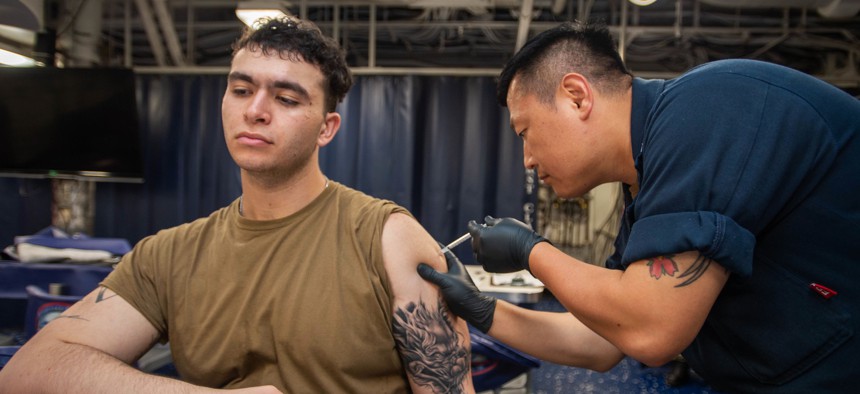
Navy Petty Officer 2nd Class Mark Forrey administers a COVID-19 vaccine to Navy Seaman Micah Dayoub aboard the USS Ronald Reagan, in Yokosuka, Japan, Sept. 9, 2022. U.S. Navy / Seaman Natasha Chevalier Losada
Ending COVID-Vax Mandate Would Divide Troops into Two Classes, Navy Secretary Says
The military would consist of “those that can’t deploy and those that can deploy. And that creates all sorts of problems,” Carlos Del Toro told lawmakers.
If Congress abolishes the military’s vaccine mandate, the Navy would be forced to separate sailors into two groups, the service’s top civilian said Tuesday.
“Unquestionably, it will create almost two classes of citizens in our services: those that can’t deploy and those that can deploy. And that creates all sorts of problems,” Navy Secretary Carlos Del Toro said at the America’s Future Fleet Symposium in Arlington, Virginia. “Let's make sure we understand the secondary consequences of our actions.”
Last week, several Senate Republicans announced they would oppose moving ahead with the 2023 National Defense Authorization Act unless they could vote on an amendment that would stop the military from booting troops who refuse the COVID-19 vaccine and restore booted troops to duty with back pay. They questioned the wisdom of the mandate during a recruiting crisis.
“At a time when the military is struggling to meet their targets for recruitment, the Biden administration is firing soldiers we invested in and trained,” Sen. Rand Paul, R-Ky., said at the press conference on Capitol Hill.
As of Nov. 30, nearly two million service members had been fully vaccinated. More than 8,200 have refused the vaccine and been separated as a consequence, according to data from the service branches.
At the Reagan National Defense Forum on Saturday, Marine Corps Commandant Gen. David Berger said the service is seeing recruitment impacts in some parts of the country where, “there are still myths and misbeliefs about the backstory behind [the vaccine].”
The COVID-19 vaccine, and all required vaccines, are “critical to make sure we can do our job,” Berger said, adding that no Marine has died of coronavirus since April.
Del Toro said that if the mandate is repealed, the “worst-case scenario” is having unvaccinated sailors serving aboard a submarine—an environment in which people work and live in very close quarters—for months at a time. The ability of viruses to spread rapidly through ship crews due to their confined environments was revealed early in the pandemic when an outbreak sidelined the USS Theodore Roosevelt aircraft carrier.
Unvaccinated sailors may also have to stay on the ship during foreign port calls, if the country has COVID-19 vaccination policies that differ from the United States, he said.
“So there’s a lot of problems that come along with that, and that’s why the secretary of defense holds firm in his belief that we should keep the vaccine,” Del Toro said.
On Monday, National Security Council spokesman John Kirby said President Joe Biden agrees with Defense Secretary Lloyd Austin on opposing the repeal of the mandate.
“He continues to believe that all Americans, including those in the armed forces, should be vaccinated and boosted for COVID-19,” Kirby said. “As you all have seen for yourself, vaccines are saving lives and including our men and women in uniform. So this remains very much a health and readiness issue for the force.”
If Congress passes a law to eliminate the vaccine mandate and the president signs it, Del Toro said the Navy “will execute smartly and we’ll come up with new policies and ideas to do the very best that we can.”







